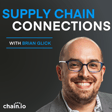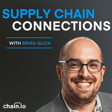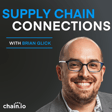
Episode 9 - Eric Johnson, Senior Editor for Technology at the Journal Of Commerce
PROFILES
SUPPLY CHAIN CONVERSATIONS
—————————————————
EPISODE 9 - ERIC JOHNSON, SENIOR EDITOR FOR TECHNOLOGY AT THE JOURNAL OF COMMERCE
'Navigating the Supply Chain Network'
—————————————————
Welcome to Episode 9 of Profiles, a podcast centred around supply chain conversations, hosted by Brian Glick, founder and CEO of Chain.io.
Our guest this week is ERIC JOHNSON. With a background in journalism and business, Eric studied for his BA in Journalism at the University of Wisconsin-Madison and also has an MSc from Leeds University.
Eric started his career at Orange County’s largest daily newspaper, where he worked for 4 years before leaving to study business in more depth. He then took a position as a business reporter with Long Beach Press Telegram in California. Eric currently sits as head of technology for the Journal Of Commerce.
Eric reports upon the most cutting edge concepts within the Supply Chain network. His passion in the process was ignited when he first realised the massive amounts of infrastructure involved in moving products from A to B. Once the light bulb went on Eric found himself immersed within the whole industry.
He recently helped organise the JOC Logistics Technology Conference (LOGTech) in Las Vegas and will be involved with the upcoming Spring TPM20 Conference in Long Beach.
“….The biggest hurdle right now is sort of cultural, and it’s not even necessarily like ‘Oh people are resistant to change’. I think a lot of it is a cultural resistance to buy capacity on a dynamic basis.”
Listen in as Brian and John discuss:
- How did Eric originally end up reporting on the Supply Chain Network
- What is it about the industry that keeps Eric interested. Is there space within the industry for external perspectives, can the industry be improved from the outside?
- What Eric finds exciting within the Supply Chain network currently?
- The trough of disillusionment discussed and how it affects perspective.
- Eric discusses his involvement with the LOG Tech conference in Las Vegas and the upcoming TPM (and El Dorado) conferences.
- Can technology integration help the Supply Chain to function better and how can these changes be implemented?
- The importance of not judging your business too harshly by comparing it to other companies. Focus on the strong points and work on the rest.
“…. You really need to make a decision. What are you really good at internally, what are you not so good at. What in the market is plentiful in terms of numbers and solutions, and prevalent, and where is investment going…. ”
Resources mentioned in the show:
Eric's LinkedIn Page https://www.joc.com/ https://www.joc-tpm.com/
https://blog.chain.io/for-forwarders-aligning-your-digital-and-business-strategies
Subscribe to the podcast in iTunes or wherever you get your podcasts so that you’re updated when we post a new episode!
Take care, and until next time,
Brian Glick
chain.io


